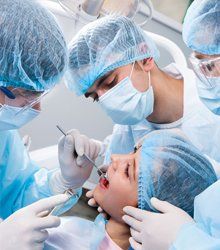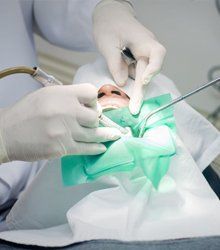Prior to your surgery
Before surgery, the oral and maxillofacial surgeon will examine your mouth and discuss the findings with you. This examination will include X-rays, and possibly other tests as well, depending on your particular case. These will show the presence and position of the impacted teeth and reveal important features such as curved roots, proximity of the tooth roots to nerves, and other vital surgical information that cannot be determined by visually inspecting the mouth.
A complete health / medical history will be taken, with particular attention to allergies, medications, or health problems that might affect surgery and / or the administration of anesthesia. The surgeon will examine your mouth for any signs of swelling or infection, and may check your blood pressure and other vital signs. It is important that you provide complete information, including the names and dosage of all medications you are taking, so the surgeon has an accurate assessment of your health prior to recommending surgery.

What to expect during surgery
Anesthesia
Modern anesthesia technology now makes it possible to perform even complex surgery in the oral and maxillofacial surgery office with little or no discomfort. During surgery, one or more of the following is used to control pain and anxiety: local anesthesia that numbs the surgical area; nitrous oxide-oxygen (sometimes called "laughing gas") for analgesia to relax you; intravenous sedation for increased relaxation; and general anesthesia that puts you to sleep. Your surgeon will discuss the available anesthetic options and will recommend the most appropriate choice to ensure your comfort during the procedure.
Oral and maxillofacial surgeons are specifically trained and experienced in the administration of local and intravenous anesthesia and the treatment of anxiety. They receive extensive training in anesthesia throughout their four or more years of hospital-based residency and are able to provide the anesthetic that is most appropriate for you. As a result, your oral and maxillofacial surgeon is experienced in evaluating patients for anesthesia; administering the anesthetic; and monitoring post-anesthetic patients. He or she is adept at handling complications that may arise from the administration of anesthesia.
In addition, practicing oral and maxillofacial surgeons must comply with individual state rules and regulations on anesthesia administration. As a member of AAOMS, your oral and maxillofacial surgeon must periodically undergo an on-site anesthesia inspection or evaluation as part of the association's office anesthesia evaluation program. AAOMS requirements are strict and often exceed those mandated by
State law.
The Surgical Procedure
The method used to remove your wisdom teeth will depend on various factors, including the position of the teeth; the length and curvature of the tooth roots; the thickness of the bone surrounding the teeth; and so on. If the teeth have fully erupted, it may be possible to simply remove each tooth intact from its socket in the bone, using instruments designed for this purpose. If gum tissue is covering the tooth, an incision will be required to turn back the gum and expose the tooth. Likewise, if bone covers the tooth, the surgeon will remove sufficient bone to expose the tooth and allow its removal.
If an incision through the gum tissue is needed to gain access to an impacted tooth, the surgeon may place some sutures at the end of the procedure to hold the tissue together and aid healing. These sutures may dissolve on their own after surgery or you may have to return to the office for their removal.
It isn't wise to wait until your wisdom teeth start to bother you. The AAOMS / OMSF study strongly recommends that to prevent future problems, wisdom teeth be removed by the time the patient is a young adult. The researchers found that older patients may be at greater risk for the development of disease, including periodontitis, in the tissues surrounding the wisdom teeth and adjacent teeth.
It is important to know that as wisdom teeth develop, their roots become longer and the jawbone denser. Thus, as a person ages, it becomes more difficult to remove wisdom teeth and complications are more apt to occur. While such complications are impossible to predict, the longer the wisdom teeth remain in your mouth, the more likely they are to cause problems. When they do, these complications may be more difficult to treat in a patient who is older. For example, periodontal infections, such as those observed in the AAOMS / OMSF study, may affect your general health.

Schedule an appointment
Hours:
- Monday
- Closed
- Tue - Thu
- -
- Friday
- -
- Sat - Sun
- Closed
Closed 12:30 PM - 2:00 PM for lunch
Ronald P. Martin, D.M.D., P.C.
125 Eagle's Pointe Pkwy, Ste. 100
Stockbridge, GA 30281
Most types of insurance are accepted. Contact our office for participating plan and pricing information.
Hours:
- Monday
- Closed
- Tue - Thu
- -
- Friday
- -
- Sat - Sun
- Closed
Closed 12:30 PM - 2:00 PM for lunch
Memberships:
- Georgia Dental Association™
- American Dental Association™
- American Board of Oral and Maxillofacial Surgery™
- Georgia Society of Oral and Maxillofacial Surgeons™
Awards:
- D.M.D. Degree from Medical College of Georgia
- Board Certification from the American Board of Oral and Maxillofacial Surgery

